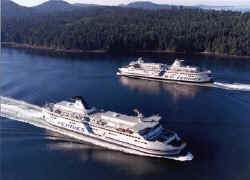
The sound and fury of a nasty labour dispute often conceals the real issues. Figuring out who won and who lost can be as difficult as divining the next day's weather from today's evening sunset.
That is particularly true of the recent full-scale strike at B.C. Ferries, which was--even by the acrimonious standards of labour-management conflicts in this province--an extraordinarily bitter dispute.
Most of the public, particularly those who use the ferries regularly, are just glad that the battle is over. The ships are sailing again, BC Ferries' incredibly vile version of clam chowder is being ladled out in the cafeterias, and one of the province's most respected labour mediators, Vince Ready, will sit down with union and management and arbitrate a new collective agreement.
However, the terms of that agreement are likely to be vastly different from what the provincial government and the management of BC Ferries were after when the strike began. The arbitrated settlement is likely to scuttle government plans for massive contracting out and major union concessions.
Captain Hahn vs. mutineers
David Hahn, the American brought in to run the newly privatized BC Ferry Services Corporation, must be wondering what happened to the sailing orders the government gave him. Those orders contemplated a drastic reshaping of ferry operations; and the target of many changes was the scurvy crew of unionized workers. That rabble needed a touch of the lash, and Mr. Hahn was hired to wield the cat-o-nine-tails
He certainly was given all the power he needed. The Costal Ferry Act, passed earlier this year, provided for the dismantling of the crown corporation set up by WAC Bennett to run ferry services for British Columbia's costal communities. Privatization of entire routes was not only contemplated by the legislation, it was all but required
The Act also specifically listed "ancillary services" which the new, private corporation no longer needed to provide for itself. Services such as parking at terminals, catering and retail concessions, reservations, vessel maintenance, and terminal maintenance--indeed any services "not directly related to the transportation of vehicles and passengers"--could be contracted out.
Dodging a trap
Mr. Hahn understood his orders and began negotiations with the Ferry and Marine Workers Union with an aggressive public relations campaign. Ferry workers were portrayed as a mutinous crew of overpaid sluggards; some of them would have to be clapped in irons, or maybe even forced to walk the plank. The captain would run this ship!
Of course, the crew saw things differently. They felt that they had been providing high-quality, efficient ferry services to the coastal communities of British Columbia long before Mr. Hahn could even locate the province on a map. And they fought back. Negotiations went nowhere, and soon a full-scale shutdown was underway.
At first it looked as if the Ferry Workers had walked into a trap. Their strike was obviously illegal, and Mr. Hahn cruised off to the courts, hoping to get the union and its leadership disciplined, fined, and perhaps jailed.
There was even dark talk about imposing an "air traffic controllers" solution. In the early 1980s air traffic controllers in the United States had gone on strike. Rather than negotiate a settlement, President Reagan simply fired the whole lot and broke the union. It seemed like a plan which the current provincial government would approve.
Who's in charge?
However, at the last moment everything went wrong for Mr. Hahn. The union agreed to return to negotiations, and he had to agree as well or risk looking like he'd rather keep flogging the crew than reach a settlement.
Then Vince Ready suggested that binding arbitration was the best way to get the ship underway again. The union agreed, and again Mr. Hahn had to go along. Mr. Ready's upcoming arbitration will undoubtedly impose some concessions on the union, but nothing close to what the Corporation had initially desired.
And Capt'n Hahn is floating around in a lifeboat, wondering why his government friends set him adrift and how he can get back on the bridge and pretend to be in charge.
Paul Ramsey is a former MLA and Cabinet Minister. He now teaches at CNC and is a Visiting Professor in the Political Science Program at UNBC. ![]()















Tyee Commenting Guidelines
Comments that violate guidelines risk being deleted, and violations may result in a temporary or permanent user ban. Maintain the spirit of good conversation to stay in the discussion.
*Please note The Tyee is not a forum for spreading misinformation about COVID-19, denying its existence or minimizing its risk to public health.
Do:
Do not: